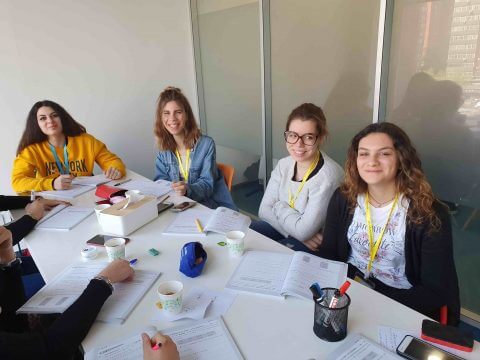How Does Language Change Your Brain?
Brain and Language: How Does Language Change Your Brain?
This blog is brought to you by former LTL employee Jan. Jan lived in China for over 5 years and, whilst working at LTL, became an excellent Mandarin speaker. Speaking English alongside his native Norwegian, he discusses how learning a language can change your brain in ways you never imagined.

I am sure that most of you have heard before how good learning a second (… or third, or fourth…) language can be for your brain:
- Lower risk of developing dementia and Alzheimer’s
- Improved creativity
- Improved cognitive ability
These are among many benefits you might have heard before.
There are certainly a lot of myths and established truths in every field, and neuroscience is no exception, whether it is about learning second languages or otherwise.
First of all, full disclosure. I am not a neuroscientist, nor a linguist. However, I do have a passion for language learning and challenging established truths.
This article will be written from a layman’s perspective and will go through some of the scientific studies which have been done on learning languages, bilingualism, how that might affect the human brain, and how the brain itself influences the process of language learning.
How Does Language Change Your Brain – Can You Teach An Old Dog New Tricks?
How Does Language Change Your Brain – How Does Language Learning Influence Your Brain?
How Does Language Change Your Brain – Get Them While They Are Young!
How Does Language Change Your Brain – The Real Value Of Language Learning
Can You Teach An Old Dog New Tricks?
Let us start with the with perhaps the most enduring myth about learning languages, you can be too old to learn new languages to a fluent level.
Related questions can be:
- What age is the best age to learn new languages?
- When is the cutoff age for efficient language learning?
- Can you become truly fluent in a new language if you start learning as an adult?

Please take a look at the aptly named “A critical period for second language acquisition: Evidence from 2/3 million English speakers” [1] published in the August 2018 edition of Cognition.
This article is extremely interesting as it was widely covered in mainstream media, and the mainstream media got the content of this article mostly wrong.
For example, The Guardian who wrote: “Becoming fluent in another language as an adult might be impossible”.
What the study actually found was that it indeed becomes slightly more difficult to learn a new language as an adult, but it is nowhere close to being impossible as suggested by certain outlets.
The researchers have actually published the dataset they used for their paper to the public!
From the data, we can see that if you start learning a new language earlier, you will become better at it, than if you start learning later.
However, there were a lot of test participants who started learning English after the age of 20, who even outperformed native English speakers.
It is not impossible to become fluent in a language when you start late, but the earlier you start the easier it becomes.
Is there any age cutoff where this happens?
In the same paper, the age after which learning languages becomes more difficult is said to be about 17-18 years old.
But, is that because of some inherent limitation of the human brain, or might it be cultural? To quote the researchers directly:

“For instance, it remains possible that the critical period is an epiphenomenon of culture: the age we identified (17–18 years old) coincides with a number of social changes, any of which could diminish one’s ability, opportunity, or willingness to learn a new language. In many cultures, this age marks the transition to the workforce or to professional education, which may diminish opportunities to learn.”
The reason for the difficulty of learning languages as an older student might be simply because there is less time and less motivation to learn as you enter the workforce and take on other responsibilities than just learning in school.
The old established truth was that the older the brain becomes, the less flexible, and less able to take in and retain new knowledge it gets.
But research from Penn State University[2] found that the brain actually takes in and retains new vocabulary (the test was actually done by exposing non-Mandarin speakers to Chinese characters) well into old age much better than previously assumed.
They also likened learning a new language to exercising your brain, making it stronger and faster just like you would exercise muscles.
How Does Language Learning Influence Your Brain?
There was already a big hint as to what effect language learning might have on your brain in the Penn State paper. But there are other studies worth checking out.

One of the most cited scientists on bilingualism is Dr. Thomas Bak.
In one of his recent papers[3], 847 participants were tested when they were 11 years old in 1947 and then retested in 2010 when the participants were in their early 70’s.
Corrected for gender, socioeconomic status, immigration status, and intelligence, bilingualism seemed to hinder age-related decline of the brain.
More interestingly, it was found that intelligent individuals got the best effects from learning a new language early, while less intelligent individuals got the best effects from learning their second language later in life.
Another interesting finding, this time from St Mary’s University in Halifax, Canada[4] shows that reading letters and characters activates the same areas of the brain.
However, reading Chinese characters does activate additional areas of the brain, not used when reading letters, or even Japanese characters!
One Swedish study[5] looked into what happens to the brain while learning languages, compared to studying other intellectually demanding subjects.
Learners of Russian, Arabic and Dari who did an intensive course going from no ability to fluent in 13 months were compared to medicine and cognitive science students.
While specific areas of the brain of the language learners grew, the non-language student’s brains remained the same. The researchers were also surprised to find that different areas of the brain grew depending on how well the language learners performed.
Get Them While They Are Young!

The adult and elderly population seems to be covered, but what about the effects on children learning a second language?
One of the myths is that teaching toddlers two languages at the same time will actually hinder their language development. One 1993 study found that such delays do happen, but that they are only temporary[5].
Further, small children can reap the benefits of bilingualism from as early as seven months [7].
Older children can see benefits like increased cognitive capacity, faster reaction times, better ability to focus, better ability to multi-task, and increased creativity, already from five years of age[8].
It is clear that learning new languages from a young age tend to have great benefits for the child in the long term.
The Real Value Of Language Learning
As we can see from the literature covered here, second language learning, or indeed multilingualism does indeed seem to have a host of positive effects on the human brain.
It aids the development of children, and it might help keep your brain strong and flexible into old age.
Interestingly it also seems that learning new languages well into adulthood has many of the same positive effects.
And remember, it’s never too late to start learning a new language, no matter how old you might be, you can still become fluent with the right effort.

However, it is important to not forget the real value of learning a second language and being bilingual.
Language at the very essence is all about communication.
By knowing several languages you will then have access to a host of opportunities and experiences you would not normally have.
It is important to talk about strong brains, cognitive abilities and decreased risk of dementia.
But do not forget that a new language will make you able to communicate, and build relations with people you would not otherwise have the ability to speak with or even meet.
Learning a new language should not only be about improving your brain, but also improving the understanding between people, cultures, nations, and communities. And in that lies the real value of acquiring a new language!
So why not get started with the basics of Mandarin now?
Want more from LTL?
Want to learn Chinese from the comfort of your own home? Then our 24/7 online Chinese lessons might be the thing for you.
We offer a 7 day free trial to all new online students where you can study Mandarin 24/7.
Come and check it out free of charge and see what you think!
If you wish to hear more from LTL Language School why not join our mailing list?
Don’t forget to check out the citations:
[1] Hartshorne, Joshua K., Joshua B. Tenenbaum, and Steven Pinker. “A critical period for second language acquisition: evidence from 2/3 million English speakers.” Cognition 177 (2018): 263-277.
[2] Li, Ping, Jennifer Legault, and Kaitlyn A. Litcofsky. “Neuroplasticity as a function of second language learning: anatomical changes in the human brain.” Cortex 58 (2014): 301-324.
[3] Bak, Thomas H., Jack J. Nissan, Michael M. Allerhand, and Ian J. Deary. “Does bilingualism influence cognitive aging?.” Annals of neurology 75, no. 6 (2014): 959-963.
[4]Conrad NJ (2016) Does the Brain Read Chinese or Spanish the Same Way It Reads English? Front. Young Minds 4:26. doi:10.3389/frym.2016.00026
[5]Mårtensson, Johan, Johan Eriksson, Nils Christian Bodammer, Magnus Lindgren, Mikael Johansson, Lars Nyberg, and Martin Lövdén. “Growth of language-related brain areas after foreign language learning.” NeuroImage 63, no. 1 (2012): 240-244.
[6]Pearson, Barbara Zurer, Sylvia C. Fernández, and D. Kimbrough Oller. “Lexical development in bilingual infants and toddlers: Comparison to monolingual norms.” Language learning 43, no. 1 (1993): 93-120.
[7] Marian, Viorica, and Anthony Shook. “The cognitive benefits of being bilingual.” In Cerebrum: the Dana forum on brain science, vol. 2012. Dana Foundation, 2012.
[8] Morales, Julia, Alejandra Calvo, and Ellen Bialystok. “Working memory development in monolingual and bilingual children.” Journal of experimental child psychology 114, no. 2 (2013): 187-202.

















 Hi, my name is Manuel! I am from Spain and I am a Student Advisor at LTL and I’m based at our Taipei school.
Hi, my name is Manuel! I am from Spain and I am a Student Advisor at LTL and I’m based at our Taipei school. Hi, my name is Mojca! I am from Slovenia in Europe and I work as a student advisor at our Shanghai school.
Hi, my name is Mojca! I am from Slovenia in Europe and I work as a student advisor at our Shanghai school.

